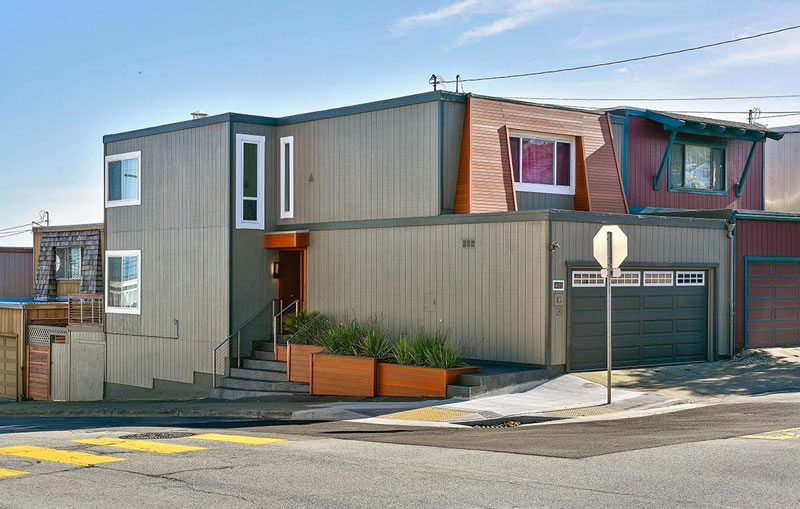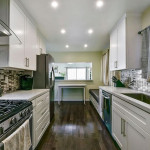Purchased for $1,080,000 in November 2014, the resale of the already remodeled Portola District home at 401 Cambridge Street has closed escrow after three months on the market with a reported contract price of $1,115,000 and $841 per square foot.
The apples-to-apples sale represents total appreciation of 3.2 percent for the three-bedroom home over the past 18 months or roughly 2.2 percent per year.





Bad news- only 2.2% appreciation
Good news- $841 PSF in portola ain’t too shabby
2.2% isn’t great but keep in mind that this place is really pushing the top of the market in this neighborhood so I would assume the growth is slow. I would guess that is you compared a house that sold for $650k in 2014 and now, the increase would be far higher. The lower end of the market seems to be seeing the most gains in this part of the city.
A single property: shouldn’t that be “apple-to-apple” comparison ??
(That it sold for what one could buy a small midwestern town of charming older houses isn’t worth even a shrug anymore, I suspect)
Obviously this is just a single data point so you can’t “prove” anything from just this one sale. But you can say that this data point isn’t inconsistent with the market having dropped. “Dropped how?”, you say, “it’s up 3%”
Think of it this way. You buy a stock in 2013 for $100 and a year later in 2014 it’s gone up 10% to $110, then in 2015 you sell it for $103. Sure it’s up overall 3%, but what can you conclude about the price change from 2014 to 2015?
It can be left as an exercise to the reader to make an assumption of the market price change of this home from Nov 2014 to Nov 2015, then given the overall 3% price change thereby infer the market price change from Nov 2015 to the present.
A good example of why real estate shouldn’t be thought of as a stock, and why people applying some economics classroom thinking get it wrong.
Sellers will in all likelihood print a loss on this sale, due to transaction costs.
No imaginary intermediate price is required to draw that conclusion.
Transaction costs and any net profit or loss to the seller don’t really factor in to what this one sale tells you about the market.
What if this had been a 6 year hold with a 10% total gain? Knowing what we know about the hold’s first 5.5 years of market appreciation, what would that tell you about the last half year?
If you google ‘case shiller methodology’ you’ll see that this is essentially how you create a price index at regular intervals even though home sales occur at irregular times with irregular holding periods.
If you want the exact same house to sell every month in the exact same condition before drawing any conclusions, well good luck with that.
This is a good comparison of ‘apples to apples’. Great work for finding this, Socketside! The 2.2% y-o-y suggests that the market is not sky-rocketing anymore. However, two things need to be said:
1) several other homes in that area (Excelsior North) have recently sold for 1+million with premiums of 10-25% over listing prices and a few more are still listed for well above 1m (check Redfin)
2) For this part of town, this house was sold for a VERY high price per sqf ($+820) In 2014. In 2014, average price per sqf in that area was around $500.
Great comment, I would just add this footnote:
As a would-be buyer I have learned listing price is all but meaningless in any desirable neighborhood in SF. The spectrum of approaches taken, for strategic reasons or when blissfully (?) ignorant of such considerations, is vast.
In our long history of looking (and bidding, and failing) we have developed an eye for what strategy is being employed… not that that has helped, obviously.
Comically low asking prices entered a phase a a year or two ago in our own Bernal Heights that I would describe as almost conceptual art: so far below reasonably expected sale price, and well below even the long tradition of ’20-30% or more below expected sale price, but you know the game’, as to constitute an almost pure gesture of baroque daring on the part of listing agents, as if in a game with other agents who will appreciate the wit.
But then another trend came up, which we call ‘aspirational pricing’–the strategy of pricing not at the default 20%-below-anticipated, but _at_ the anticipated sale price, to fish for overbids by naive bidders (or investor types just looking to park money anywhere, damn the upside)… because hey who knows? Anything can happen and sometime does!
As the market has cooled we’ve seen a decline locally in that, following a round of overpriced properties languishing on the market without the anticipated quick sale… sometimes even with price revisions…
But yeah. I myself continue to be aghast at bids which require a ridiculous % _over_ and in particular have become downright hostile with listing agents who underprice, in a straightforward attempt to rob prospective buyers in a sellers’ market of _any_ useful information… an ethos that we have also experienced numerous times in the ‘multiple counter’ scenario… and the practice of round-robin calling buyers’ agents soliciting competitive bids, auction style, while ‘reviewing’ offers…
Sigh. With that in mind, my wife and I sure hope this is yet one more sign of ‘normalization’ locally. We aren’t trying to invest, we’re just trying to stay in the city long enough to see our kids through their great public school.
Silly us. Silly, silly, us.
Why does pricing at the anticipated sales price bother you? I don’t follow that.
It doesn’t per se, it’s merely that a minority pursuing a different principal just removes more information from the system, leaving would-be buyers with even fewer reference points to navigate by.
Personally though I do also find it unseemly to be using a strategy that within that context is also clearly predicated on the desire to exploit (sorry, ‘convert’) that lack of information (e.g. about what constitutes a competitive bid) for a few more dollars.
That’s the agent’s job, yep… but I find it off-putting as someone trying to buy a modest family home for my family. And in the context of the massive windfall the market has been providing people almost entirely by luck, those few extra dollars often appear–from _our_ perspective–gratuitous and to often come at the expense of people like us (decades-long residence of the city and neighborhood priced out by the massive influx of investment here).
That’s what it is, and every actor is acting _rationally_. As someone shut out by virtue of lacking the foresight to accumulate family money, a tech equity windfall, etc., it’s just cause for nihilism and despair.
Anyway, if it were the _norm_ that’d be great. My family, we will likely end up having no choice but to relocate to some market where it is. :/
Some of what you’ve observed could be strategic pricing. But some is probably agents ‘Skating to where the puck used to be’ in the face of changing rates of appreciation.
Figure out how much a house is worth to you, and bid that price.
You buy the house, you win.
You don’t buy the house, you win.
Sleep well.
But what’s a house worth if it’s expected to appreciate at 15% per year? v.s. if expected to appreciate at 10% per year? v.s if expected to flatline? v.s. decline in price?
The reality is that there is a strong feedback between price expectations and demand at a given price point.
That’s what makes a market – buyers and sellers make these estimates for themselves.
So, decide what a house is worth based on your expectations and needs and ability, and bid that price.
Alternatively, you can jostle and bid low and hope it works out, as it does for some. But if you want to take the emotion out, don’t use hope as a strategy.
Put your best foot forward, be pleased if you win, and pleased if you lose.
So, unlike any other product, people should be willing to overpay for a home? Would you give the same advice to anyone buying a car? A flight? A pair of pants? A sack of potatoes?
Is it overpaying or just having irrational expectations? And how quickly and dramatically can expectations change?
If I could guarantee that a house would appreciate 10% or 15% YoY of course you should pay more for it. But how rational is that expectation? Run the numbers to see what a 10-15% YoY gain would come out to at the end of your 30 year mortgage. What would that price level do to supply? Or demand? Who’s buying at that price level? What if price expectations change? Who’s buying multi-million dollar properties expected to decline vs when they are expected to appreciate?
The reality is that mass expectations of price increases fuel actual price increases. And this positive feedback loop continues right up until it can’t continue anymore. And while you or your friends may not be willing to bank on 10% YoY home price gains when making a home purchase, if someone is willing to bank on that then they set the price level, for a while that is.
“Run the numbers to see what a 10-15% YoY gain would come out to at the end of your 30 year mortgage. What would that price level do to supply? Or demand? Who’s buying at that price level?”
OK. So people who bought let’s say a 100K house in places like the Mission in the mid 80s? at 10 % annually, that’d be like 1.7M now. People are buying those up right away if they even hit the market. Demand is there.
“that’d be like 1.7M now.”
And at 10% per year for the next 30 years that 1.7M would end up at $27M. For 15% that would turn into $98M.
If you think that those price levels could be sustainable without it either inducing a massive supply increase or causing demand to look elsewhere, then I guess you’re entitled to your opinion.
Hmm, 25,000 units in the mission $27M a piece… $6.8 Trillion total value. The GDP of all of China is about $11T so maybe chinese buyers can take over SF in the future, at least the mission district.
I don’t think that personally, no. I also don’t know what 27M will feel like to the average consumer in 30 years. Anyway, deep in the Mission houses were probably more like 60 grand or so back in the mid 80s.
I feel your frustration. This business is marked by a lack of transparency and shady principles that would not be tolerated in just about any other business setting. It can be very exasperating, particularly to be a buyer in a hot market. One example: we looked at one place that was literally teeming with excited people at the open house. Our realtor told us that it seemed to her that most or all were just friends of the seller or his realtor (i.e. shills). We didn’t bid because we weren’t crazy about the place – and nobody else did either. Place never sold, so it appears our realtor was right. Stuff like that is an accepted practice. In most areas of business in which I deal, you pull something like that once, and your reputation in the business community is ruined.
My advice would be to not be tempted to overpay – you won’t be happy if you do unless you have enough cash to burn that it doesn’t really matter, or if the market were to continue to skyrocket and paper it over. Run the numbers and see what works, and do a good market analysis. An anecdote: when we bought our house (early 2012, a slow market), my wife and I both loved the place. It had already had one price reduction. We would have been perfectly happy to pay several hundred thousand more than the new asking. But we also were quite confident that we did not have much competition given the market, and through some sleuthing we determined that the sellers probably couldn’t care less what they sold it for. So we bid under asking, with almost no conditions except an inspection, and we got the place and closed quickly so the sellers were happy. Got it for far less than it was “worth” to us and we avoided feeling like chumps by “winning” only through overpaying.
Fast forward a year to when we sold our old place (waited because a relative stayed there). Market had now started to really turn around. We priced it at the high end of what we thought the market would reasonably bear – no games intended; we primarily just wanted to sell quickly for some specific tax reasons. We had a few bids at asking or a little above, and one bid at 25% over asking with no conditions at all. We took that, of course. Those buyers could have gotten the place for substantially less – don’t know what they were thinking when they bid or who advised them. Maybe they are thrilled regardless (they probably are fine since prices are up even more than 25% since then).
I’ve said many times that I’d far rather be a seller in a market like this than a buyer. The opposite is true in a down market, which will come eventually. So hang in there.
A few even more important things to be said:
1. We didn’t ‘find’ nor go looking for this apples-to-apples comparison, we’ve consistently followed its sales history for the past two years. And had it just shown 50 percent appreciation, it would have received the same coverage.
2. Had the listing agent’s original under pricing strategy not failed to generate the expected over bids, this home would have officially just sold at a “premium” of over 10% as well!
3. Your 2014 average isn’t for like homes. And in fact, this home sold for $560 per square foot in 2005, but that was prior to its renovation.
1. & 2. I don’t think you ‘cherry-picked’ this information. In fact, I remember you reporting about it before. My point is not to accuse Socketsite of misrepresenting things, but to add some context in order to better understand if this is an indication of changing market dynamics.
3. Given the the unusual repricing and timing of the listing (death January), it looks to me like the agent botched this listing big time. Also, other than the ‘interesting’ siding, the average interior finishes, partial views and smallish kitchen don’t strike me to make it a ‘highly desirable’ home for this part of town. But obviously, his is just my opinion and I’m happy if/when people disagree.
Small YoY price increase seems to reflect the more balanced market we’re currently experiencing.
Prices are neither increasing nor decreasing rapidly.
“Prices are neither increasing nor decreasing rapidly.”
Housing prices never decrease rapidly. Prices can inflate rapidly, but on the way down, housing is the stickiest market known to man.
One thing to keep in mind is that asset bubbles never “level off”: the correction always overshoots . It doesn’t happen fast, see above. Maybe this will be the first asset bubble that becomes a “more balanced market,” and if so, it would be a fascinating historical anomaly studied by economists and statisticians for generations to come. Of course, you might disagree that we have been in a hyper-inflating (aka “bubble”) market since shortly after Ben’s ZIRP began to work its asset-boosting magic, but that would require a different definition of “bubble market” than that used by most economists.
“Housing prices never decrease rapidly. Prices can inflate rapidly, but on the way down, housing is the stickiest market known to man.”
I totally disagree. The last time house prices fell, they fell rapidly. Even in SF, where it seemed most to all of the decline happened between October 2008 and Spring 2009.
Agree with REPA.
If anything, prices came down in an elevator and then back up on the escalator from ’08 to present.
I agree with your disagreement!
And that’s precisely why you need to take the data you can get and do what you can to estimate what the market’s doing.
This apple is an 18 month apple, but that’s a pretty short hold. The most likely thing is to see a bushel 5-6 year hold apples. And if you get a 5-6 year hold apple you can either use that data to infer what you can about recent changes in the market, or wait a few years until the dust settles. But know that if you wait, you may miss some fairly large market moves.
Two beers has it right by my read and recall. The last crash was remarkably fast in comparison to most housing declines, but there was still a pretty steady downward decline for about two years from 2007-2009, followed by about three more years of bouncing around with a less steep decline. Then a remarkable run-up starting in about mid-2012. Socketsite posts these charts monthly, and Paragon also has a 20-year chart (namelink).
Housing crashes play out far more slowly than stock market crashes – far “stickier” as two beers points out. Even if the uber-bears turn out to be right (which I would not bet on), I wouldn’t look for any real bargains in SF for three years or more once it all starts.
Both you and Mr. Beers have good points and I don’t want to disagree with you two so much as to merely state my own opinion. So I’ll just state my speculation that we’re going to see more volatility in SF housing prices and more correlation with other financial factors than we’ve seen with housing in the past.
I think in the past some of the stickyness reflected a more conservative approach to housing purchases and more predictable career paths. A medical resident or law associate 20 years ago stretching to make a housing purchase was in a very different situation than a startup employee hoping to strike it rich on their options in a profitless company. Surely in both cases some individuals make it and some don’t.
But tech starups rise and fall in waves vs the individual successes and failures of professionals in the past. And the sheer past price changes of housing leads people to set their future expectations for prices which feeds back into demand changes if these price expectations are not met.
I don’t think so. More like 2007 was a peak year of that cycle for SF real estate in both price and volume, and 2008 was tops in price for right up until October or so.
@ aaron-in-sf
Hope you guys can find a place and stay in the City.
I do think things are normalizing in terms of lower annual appreciation. More in line with other urban markets. Perhaps a small price drop this year – nothing major though IMO.
This is anecdotal, but a number of folks in my neighborhood get a monthly Coldwell Banker price estimate update for our homes. Price estimates peaked in 11/15 and have slid a bit since. Down about 3% – 4% based on the latest update.
I live on Mt. Davidson which is not the most desirable area in the City (too much vegetation, too many lawns, too many windy streets – I’ve been told often by others if they wanted that they’d move to suburbia – LOL) .
Still, its a solid middle-class neighborhood and prices seem to be edging back a bit here.
I purchased a new home in Ohio a year ago this month. I exchanged a rental property in California for several there.
One thing I knew going in was this area had a usual 3 – 4 percent increase in home prices over the long haul. My property manager reminded me often (before I bought) that this is not SF and there will be no 10% annual appreciation. That was fine by me as I wanted a solid cash flow manager then w.
Maybe so, but once you factor in the broker commission cost how much did you really make? Not much, if that.
District 10 will be ground zero for price declines. A lot of newcomers to SF settled for these areas because they were priced out of neighborhoods that have decent lattes. When the market begins to turn, they will be ready to jump ship.
The last neighborhoods to feel the boom are the first to bust. Last in, first out.
Wrongo cowboy. D10 is affordable. It won’t bust as much as places like the mission, which have seen insane appreciation in the last 3-4 years. Just like in 2009-11, the mission fell less than higher flying hoods. Back then the mission was more affordable, less hyped, the little engine that said it could. Well Bayview and most of d10 are the little engine that said it could of this cycle. And the mission is now the high flying, hyped hood. C’est la vie.
You’re talking your book.
Nope. I own in BV as well as the mish. And I expect the mish to fall harder.
I’m honest. Every day, every day, every day I write the book la lala la la…
@ Sabbie – doubt it, there is more at play here than just cost, the urban renaissance of cities is moving to the outer areas as apartment dwellers, young couple and families tire of that lifestyle and look for more space while still being a part of city life. I think it’s going to take another cycle for these neighborhoods to fully catch on but the upward trend is well underway. The change is large enough that the speciality latte amenities are starting to follow which will only fuel more desirability as the city continues to grow in population and therefore price.
Well I drove down San Bruno Ave. about a week ago, and don’t recall noticing anything that I would file under “renaissance”. I agree about the trend towards urban living, but a big part of that is: as much as hipsters love their coffee, they hate their cars. Most of Portola, and other big swaths of D10, are less convenient to BART and light rail, and not very bike friendly either.
Agreed. The problem some of these areas are going to see is that they *have* become expensive due to people choosing them as a plan C or D when recent low supply in the city makes more desirable areas unavailable. But yet they haven’t seen the renaissance that a Bernal or a Valencia St has seen. And for areas which have failed to see a renaissance even with the last few massive boom times, you have to ask if a few massive bubbles didn’t do the trick, what will?
If you expect your $1M home to be your 10% per year meal ticket it’s easy to rationalize away problems. But if expectations change and the financial upside goes away, these areas could take a double hit as the reality of living in an area with urban problems without many urban benefits sinks in.
And while some trend towards urbanization is real, I saw an article a while back that surveyed some younger generation folks and many reported wanting to eventually live in a less urban area, but being compelled to be in a city because that’s where the jobs are.
It’s a good point that San Bruno hasn’t see the revival of a Cortland Ave in Bernal or Valencia St. in the Mission (This is why 3 bedroom houses go for under 1m, rather than for 1.3m). But Portola is a short Uber ride to work in SoMa or to restaurants in the Mission. This is a major consideration for young people. Similarly priced neighborhoods in the East Bay do not allow for that. Therefore, Portola might be suburby enough to allow you to afford a 3 bedroom house while not giving up completely on urban living (yoga lessons in the mission, meetups in SoMa etc.)